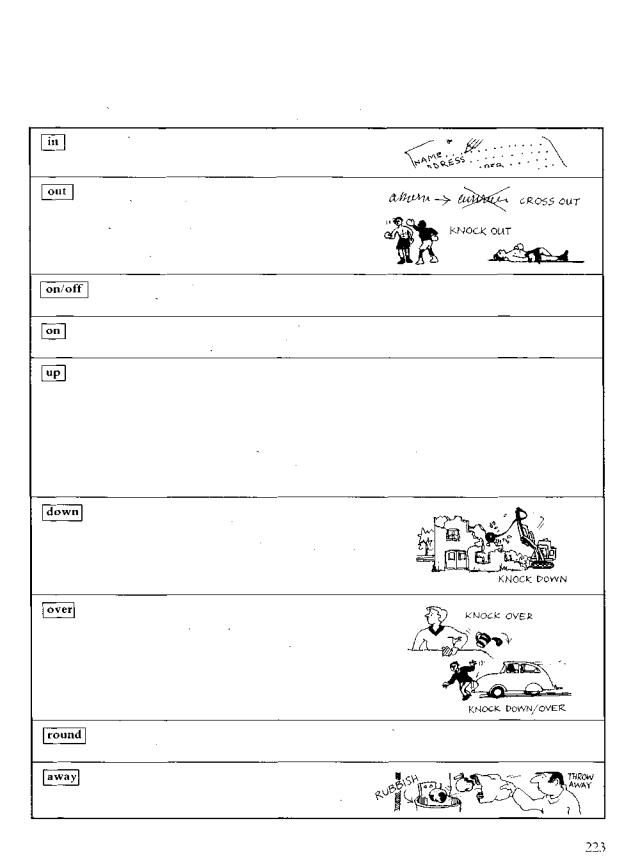
IU_Gram_Essential_1st
.pdf

4.3 -ing
Verbs that end in -e (make/write/drive etc.): |
|
|||||||
-e —» ing: |
|
|
|
|
|
|
|
|
make—» making |
|
write—» writing |
come—> coming |
dance —» dancing |
||||
Verbs that end in -ie (die/lie/tie): |
|
|
||||||
-ie—» -ying: |
|
|
|
|
|
|
|
|
lie f l y i n g |
die —» dying |
|
|
|
||||
4.4 stop —» stopped (p —> pp) / big —» bigger (g —» gg) etc. |
|
|||||||
vowel letters |
(V): |
a |
e |
i |
o |
u |
|
|
consonant letters |
(C): |
b |
c |
d |
f |
g k 1 |
m n p r s |
t |
Sometimes a word ends in ii vowel + a consonant (V' + C) - for example, stop. big.
Before -ing/-ed/-er/-est, the consonant at the end (-p/-g/-t etc.) is 'doubled' (—> - pp - / - gg - / - tt - etc.) For example:
|
V+C |
|
|
|
|
stop |
S T O |
P |
p—»pp |
stoppingg |
stoppedd |
run |
RU |
N |
n—»nn |
runningg |
|
get |
GE |
T |
t—»tt |
gettingg |
|
swim |
S W I |
M |
m — » m m |
swimmini ingg |
|
big |
BI |
G |
g—»gg |
biggerhigger |
biggestt |
hot |
H O T |
t —> tt |
hotterr |
hottestt |
|
thin |
T H I |
N |
n—»nn |
thinnerr |
thinnestt |
This does not happen |
|
|
|
|
|
a) if the word ends in two consonant letters ( C + C): |
|
||||
|
c+c |
|
|
|
|
help |
H E L |
P |
helping |
helped |
|
work |
W O R |
K |
working |
worked |
|
fast |
F A S |
T |
faster |
fastest |
|
b) if the word ends in two vowel letters + a consonant letter ( V + V + C):
V+V+C
need |
N |
E |
E |
D |
needing |
needed |
wait |
W |
A |
I |
T |
waiting |
waited |
cheap |
C H E |
A |
P |
cheaper |
cheapest |
|
c) in longer words (two syllables or more) if the last part of the word is not stressed:
|
|
stress |
|
|
|
|
happen |
= |
HAP-pen |
—» |
happening/happened (not 'happenned') |
||
visit |
= |
VIS-it |
—» |
visiting/visited |
|
|
remember |
= |
re-MEM-ber —» remembering/remembered |
|
|||
but prefer |
= |
pre-FER (stress at the end) |
—> preferring/preferred |
|
||
begin |
= |
be-GIN (stress at the end) |
—> beginning |
|
||
d) if the word ends in -y or -w. (At the end of words, y and w are not consonants.) |
||||||
enjoy—» enjoying/enjoyed |
snow/snowing/snowed |
few/fewer/fewest |
||||

APPENDIX 5 Phrasal verbs (look out / take off etc.)
This is a list |
of sonic important phrasal verbs (• Unit 101): |
|
look out /watch out = |
be careful: |
|
- |
Look out! There's |
a car coming. |
come on = be quick / hurry:
-Come on! Everybody is waiting for you. hold on = wait
-Can you hold on a moment, please?
(= can vou wait?) carry on = continue
-Don't stop working. Carry on. (= Continue working.)
-A: Excuse me, where is the station please?
B: Carry on along this road |
and turn right at the traffic lights. |
||
(= Continue along this road) |
|
|
|
also go on / walk on / drive on |
= |
continue |
going etc.: |
- Don't stop here. Drive on. |
(= |
Continue |
driving.) |
wake up = stop sleeping:
-I often wake up in the middle of the night.
get up = get out of bed:
-What time do you usually get up in the morning?
grow up = become an adult:
-What does your son want to do when he grows up"
speak up = speak more loudly:
-I can't hear you. Can you speak up a bit?
wash up = wash the dishes, plates etc. after a meal:
-After we finished eating, we washed up.
hurry up = go more quickly:
- Hurry up! We haven't got much time.
give up = |
stop |
trying: |
|
- I know |
it's |
difficult but |
don't give up. Keep trying. |
slow down = go more slowly: |
|||
- You're |
driving too fast. |
Slow down. |
|
break down = |
stop working (for cars/machines etc.) |
||
- I'm sorry Em late. The |
car broke down. |
||

APPENDIX 6 Phrasal verbs + object
(ring up my friend / put out a fire etc.)
This is a list |
of sonic important phrasal verbs + |
object |
(• |
Unit |
102): |
|||||
fill in |
(a |
form) (= complete a form): |
|
|
|
|
||||
- |
Can you fill in this form, please? |
|
|
|
|
|||||
put out (a fire / a cigarette): |
|
|
|
|
|
|||||
- |
The fireman arrived and quickly put the fire out. |
|
||||||||
cross out |
(a mistake / a word etc.): |
|
|
|
|
|||||
- |
If yon make a mistake, cross it out. |
|
|
|
||||||
knock out = make |
unconscious |
|
|
|
|
|||||
- |
A stone fell on my head and knocked me out. |
|
||||||||
switch on/off (a |
light, TV |
etc.) = |
turn on/off: |
|
|
|||||
|
- |
Don't forget |
to |
switch |
off the |
light |
when |
you |
leave. |
|
try on |
(clothes) = put |
on clothes to sec |
if they fit |
you: |
|
|||||
- |
(in a |
shop) 1 like that jacket. I'm going to try it on. |
||||||||
ring |
up = telephone (also ring - without 'up'): |
|
|
|||||||
- |
Can you ring me up tomorrow? (or . . . ring me tomorrow?) |
|||||||||
give up |
= stop something that you do: |
|
|
|
||||||
- |
T o m |
gave up s m o k i n g three years ago. (= he stopped smoking) |
||||||||
- |
I started learning Italian but I gave it up. |
|
|
|||||||
look up (a word) (in |
a |
dictionary): |
|
|
|
|
||||
- |
I didn't know the meaning of the word, so I looked it up in a dictionary. |
|||||||||
turn up |
= make louder (TV, radio, music etc.): |
|
|
|||||||
- |
Can |
you turn the radio up? I can't hear |
it. |
|
|
|||||
knock d o w n (a building) = demolish
—They are going to build a new school and knock d o w n the old one
turn d o w n = make more quiet (TV, radio, music etc.):
-The radio is too loud. Can you turn it down . please?
knock over (a cup / a glass / |
a person etc.): |
|
||
- |
Be careful with your |
cup. |
Don't knock it |
over. |
also |
(be) knocked d o w n |
/ knocked over (by a |
car etc.): |
|
-There was an accident at the end of the road. A man was knocked over (or knocked down) by a car. (be) run over (by a car etc.):
-A lot of animals are run over on busy roads.
(These sentences are passive |
• Unit 20.) |
|
||||
show (somebody) |
round = |
take somebody on a |
tour of a place: |
|||
- |
We visited a |
factory last week. The manager |
showed us round. |
|||
throw away (rubbish |
etc., |
things you don't want): |
||||
- |
These |
apples |
arc |
bad. |
T h r o w them away. |
|
- |
Don't |
throw |
away that picture. I want it. |
|
||






